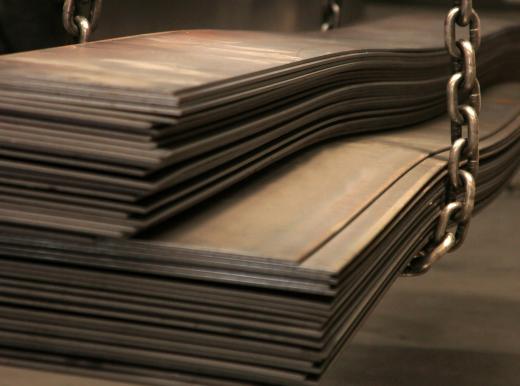Sheet metal is metal formed into flat sheets through a rolling, extrusion, or hammering process, depending on the type of metal and how it will be used. This material is available for a wide variety of tasks, from installing metal flashing on roofs to building space ships. Companies involved in sheet metal production typically make an array of gauges and grades to meet different needs, and it is also possible to custom fabricate particular types by special request from customers.
The gauge of a sheet metal product refers to the thickness. Consistency of metal products can vary and some may be very even, while others may have a slightly more coarse thickness with bumps and lumps. Usually rolling processes maintain a very smooth state, with an even composition. Different nations have their own standardized gauging systems, depending on the system of measurement they use.

Grading is a measurement of quality. Each type of metal has its own grading scale, referring to purity, corrosion resistance, and other traits that may be of importance for various metals. High grade sheet metal is more expensive, as it is of higher quality and tends to be more versatile. Lower grades are less costly and may be suitable for many applications, unless a project has very narrow tolerances or specific needs. When sheet metal is being used as a conductive material, for example, it needs to be of good quality to prevent problems with the product.

Some types come with special treatments. Companies may galvanize, stamp, or coat it for different needs. It may come in flat sheets or rolls for various applications, and sometimes includes a thin film left in place on the metal until it is fully installed. This is common with products like brushed or polished metals used as cladding for buildings, where the company wants to prevent gouges and scuffs during transport and construction. Workers can remove the protective sheeting at the end of construction to expose the clean layer underneath.

Hardware and home supply stores carry sheet metal for home improvement projects. It is also available directly through manufacturers or metal dealers for large-scale projects. Companies with high sheet metal needs like car and airplane manufacturers may fabricate their own or establish a contract with a supplier to make sure they will always have enough. Consumer prices tend to be high, while wholesale contracts for large volumes can result in a low cost per sheet because of the sheer volume of sheet metal being sold.









